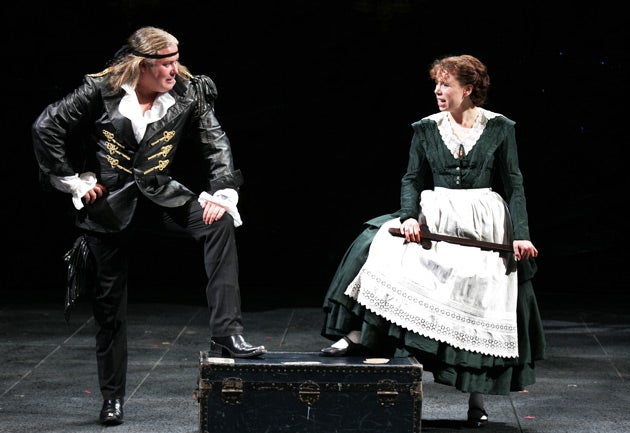All's Well That Ends Well, National Theatre, London
Well short of a fairy-tale ending

Your support helps us to tell the story
From reproductive rights to climate change to Big Tech, The Independent is on the ground when the story is developing. Whether it's investigating the financials of Elon Musk's pro-Trump PAC or producing our latest documentary, 'The A Word', which shines a light on the American women fighting for reproductive rights, we know how important it is to parse out the facts from the messaging.
At such a critical moment in US history, we need reporters on the ground. Your donation allows us to keep sending journalists to speak to both sides of the story.
The Independent is trusted by Americans across the entire political spectrum. And unlike many other quality news outlets, we choose not to lock Americans out of our reporting and analysis with paywalls. We believe quality journalism should be available to everyone, paid for by those who can afford it.
Your support makes all the difference.It's not surprising that even a director so talented as Marianne Elliott should, on being faced with this loose and lumpy play, cry, "Help, help! Concept!" But the fairy-tale design here, instead of lightly entwining the disparate strands of this queer comedy, is ugly and overemphatic. To the rear of Rae Smith's set is a black cliff with puny, leafless trees growing from pointed outcrops and a face that, covered with boards nailed every which way, looks like an abandoned building. Clouds drift across a grey sky. As my companion remarked, "I thought Hamlet was tomorrow night."
Where the design is not gloomy and tacky (those rock formations look as if they're made from dustbin bags), it is clumsy and twee. Lotte Reiniger's exquisite animated cartoons – as well as the paper-cut art of today – may have been its inspiration, but the effect is Walt Disney, with a huge owl that comically flaps its wings against a sky dotted with winking stars. The crazy mixed-up costumes are jarring – Edwardian comic opera, contemporary high street, and, in the substitute-bride scene, a combination of cunning little vixen and bunny girl. Rather than serving as a background for heroines of fairy-tale graciousness and pluck, this fantasy shakes its pompoms in our faces.
Perhaps the strident invitation to fun made Clare Higgins feel she had to compensate with an unusually stern and harsh-voiced Countess of Rossillion. She and her adopted daughter, Helena (a likable but too deferential Michelle Terry), are, as they should be, the best verse-speakers among the females.
Among the men, however, the finest work is done in the minor parts, by a relative newcomer to Shakespeare-land (sardonic Elliot Levey, as Dumaine) and one of its oldest inhabitants (debonair Michael Thomas, as Lafew). George Rainsford's Bertram is so childish that he makes one wonder even more than usual why Helena is so keen on him – he's seen, before the play begins, slashing at imaginary monsters like an eight-year-old, and leaps and wriggles at the thought of bedding the girl he fancies. Conleth Hill's Parolles is coarse and sluggish, his lack of energy during the betrayal scene providing no charm to counter his distasteful behaviour, and Oliver Ford Davies's King is an old lion assuring us with every line that he's really an old pussycat.
With a cast that drifts in and out of audibility, this All's Well needs more attention to basics, including the human need, far more basic than that for diversion, to be reassured that our yearnings are taken seriously by kindly gods.
To 30 September (020-7452 3000)
Join our commenting forum
Join thought-provoking conversations, follow other Independent readers and see their replies
Comments